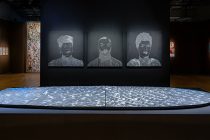Mali Blues is a poetically shot documentary featuring stars of the Malian music scene united in a common fight for preserving their culture. In the country torn by conflicts and facing the rise of radical Islam, music and dance become forbidden and the reality becomes more dangerous and hostile. German director Lutz Gregor decided to follow Fatoumata Diawara, Tuareg singer Ahmed Ag Kaedi, rapper Master Soumy and Bassékou Kouyaté to show their efforts to save the cultural heritage and freedom of speech in the motherland of blues. KRULL met up with Gregor at Stockholm Film Festival, to talk about Mali’s cultural richness and the personal stories behind the movie.
How did your adventure with Mali start and how did you come up with the idea for the movie?
Around 2007 I saw a picture of a little girl running through a sandstorm in a magazine. It was so beautiful and full of emotion that I immediately needed to know where it was. There was also an article about famous manuscripts from Timbuktu in the same magazine. I decided to make a film about it and applied for financing help, which I was lucky to get quite directly.
That was how I did my first movie in Mali in 2008. Another one followed in 2011. I started loving the country, but of course also seeing all the problems. When I left in October 2011, I could already sense some tensions- something was going to happen. In March 2012 there was a coup d’état, and shortly after I saw Fatoumata Diawara’s video to her song ‘’Mali Ko’’. It was her call to all the musicians from Mali for singing for peace and reconciliation. One month later I approached her after her concert in Hamburg and we immediately decided we should do something bigger about it. After ‘’Mali Blues’’ I did my fourth film about Mali, about rescuing ancient manuscripts, endangered by the Islamists. The manuscripts were my starting point and the ending one, and ‘’Mali Blues’’ happened in between.
It looks like you concentrate a lot on the role of art and culture preservation.
You are right. I only understood it after making the movies- the connection is cultural heritage. It’s something that touches me. If these manuscripts are threatened, both by climate change and then by the people, I felt happy if I could contribute to saving them. ‘’Mali Blues’’ was the same- the music, which is one of the cultural riches of Mali, is in danger. Musically Mali is on a very high level. Blues really has its roots there. To forbid music there is like killing somebody or not allowing them to breathe. We decided to do something to preserve the right to freedom of expression.
How was the experience of getting to know Mali’s culture from a position of an outsider? Were you reflecting on your role as a presenter of this culture through your own, foreign lens?
I think an attitude full of respect is fundamental for making this kind of movie. I cannot arrive from a place of judgement, thinking: I know much better than you do. Even though, I would sometimes discover colonialist structures and attitudes in myself and I needed to tell myself: Stop. It is their life, they are living it their way and I am not here to judge or advise on things.
We also had discussions about the postcolonial view on Africa. We had a black sound engineer from Mauritius. He asked me in the beginning of our collaboration: why do you want to make that film? I answered: I think one of the most important reasons is that when I am here I feel people are laughing much more than we do in Europe, although they are very poor. They don’t complain as much as we do. And he said: Oh stop it. I can’t hear it anymore. Always the same story about the poor but happy African children. That triggered my mind. I would listen and discuss the scenes while shooting afterwards, to challenge my perception. It was a learning process and that man corrected me and that’s why I could get rid of some of my clichés.
How was the reaction to the movie in Mali?
We did a screening for the cast and friends in Mali before the premiere and one of the viewers there told me: you did a movie that could be made by an African director, because you have not shown all the clichés about Africa. I was happy that being there for the tenth time at least I learned something and I have avoided something. But of course, it is still a point of view of a white male looking at African reality. I cannot escape it.
I saw another movie from Mali presented at Toronto Film Festival, ‘’Wulu’’ by the Malian director Daouda Coulibaly. He shot almost the same locations, the same environment but from an insider’s perspective, while we did it from an outsider’s perspective. It was very interesting to see this difference. Yet, this is my natural attitude- I can be just standing there and observing.
How was the dynamic between the four singers you follow in the movie?
There are 30 bigger tribes and many different languages in Mali but it is a truly multicultural country. Of course, there are some ethnic tensions as well, but fortunately not in the way as they’ve been in other countries, such as Congo or Rwanda. These dynamics have played a certain role between the musicians, although they were not really visible in the movie. Bassékou comes from a highly respected family with long musical traditions, that used to play for the kings and presidents. He wanted to make a video featuring all the musicians coming together as a symbol of uniting all the cultures in Mali. The message was: we are all one. In reality, he hates Tuareg people like the singer Ahmed, starring in his video. It became clear for me during the shooting, that he thinks they are all liars, drug traffickers and that they exploit other black people. You need to understand, that there are also racial structures between the tribes. The Tuaregs used to have black slaves. Of course there is a lot of resentment regarding their history.
Master Soumy is very different. He is very honest and as a rapper he does not bow to praise the authorities. He doesn’t need to harmonize conflicts, he can just criticise openly. Fatou and Ahmed shared a beautiful connection while learning about each other’s music culture in one of the scenes. Fatou has an incredible gift of adaptation. She met Ahmed for the first time during the movie. Suddenly she was able to join him on stage during one of his concerts and sound as if they it had been rehearsing many times before. Ahmed still has his family in the Islamist occupied area of Kidal. He lives in Bamako to earn money and provide for his family. Hopefully thanks to the film he will be able to tour more. We are looking forward to building a ‘’Mali Blues’’ tour combining screenings and music performances.
There is a certain aesthetic of stillness and contemplation repeating through the movie- scenes without dialogues. Images with just some light music in the background, yet with a tangible tension and melancholy. Is this aesthetic a part of your perception or a particular blues atmosphere of Mali?
As a filmmaker, of course you always work based on your own perception and personal aesthetics. But I was also emotionally invested, so I would be sensitive to the world around me. There is a scene between Fatou and a little boy, that is full of unexplained sadness and tension between them. I noticed this neibours’ kid, hanging around her house, and I asked her why did he always look so sad. I discovered the mother of the boy had died, but he didn’t know about it. His father would pretend that she was still down in the village. Fatou was telling us her story about her own sadness and grief and how that led her to discover music. So the sad little boy became a kind of mirror of her own story. He was also discovering music through her. They were attracted to each other because of their common melancholy.
Were there any interesting scenes that did not make into the movie?
We had quite many of them and hope we can add them as extra material on our DVD.
Fatou can sometimes be a diva and everyone needs to do as she pleases. She wanted to have a scene with a big music star in Mali so we went to see Toumani Diabaté – a god of Mali’s traditional instrument koura, a highly respected old musician. He is a very tiny, modest and shy man. Yet Fatou dared to get on the stage with him and completely took it over. She was standing while everybody was sitting, overshadowing the tiny man. She wanted to be shown with a big star, but she didn’t respect him enough. And in the cultural hierarchy of Mali he is much higher, because of his age and life-long fame. We couldn’t shoot the scene complete.
There is also a scene with Bassékou that touched me deeply. He was giving money for providing electricity to a very poor neighbourhood. Everybody there is very grateful for his work, so when we went there everybody was greeting and praising him. We met a blind man that started to play a kind of koura for us. Bassékou joined him spontaneously on the guitar and the cameraman was shooting ten minutes in one single shot. It was beautiful. But we couldn’t show it, because it didn’t really fit the storyline. I was so sad, cause it was an exceptional moment- but sometimes you need to let things go. All the four musicians had so interesting stories, that each of them would deserve a separate film, but for me the interesting part was showing them meeting and fighting for the preservation of the culture in Mali.
words: Weronika Pérez Borjas
photos: Konrad Waldmann
Press Pictures courtesy of Stockholm Film Festival and Lutz Gregor










